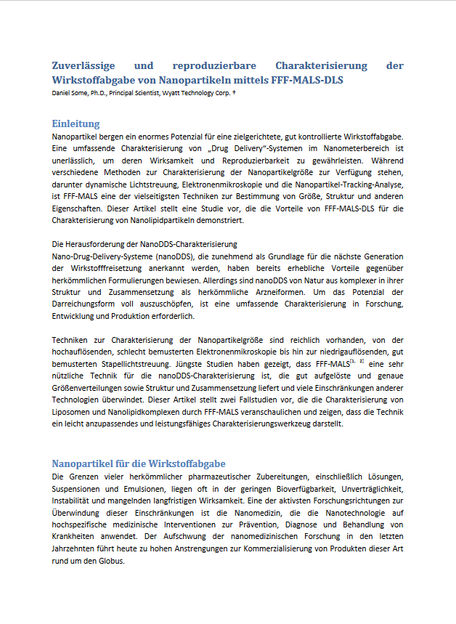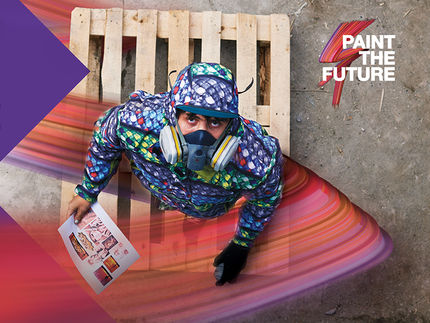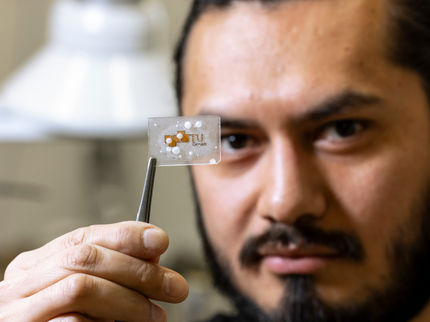Nanotechnology and sunlight clear the way for better visibility
A new coating developed by ETH researchers prevents fogging on transparent surfaces. Rather than using electricity, the coating relies on sunlight to heat the surface.
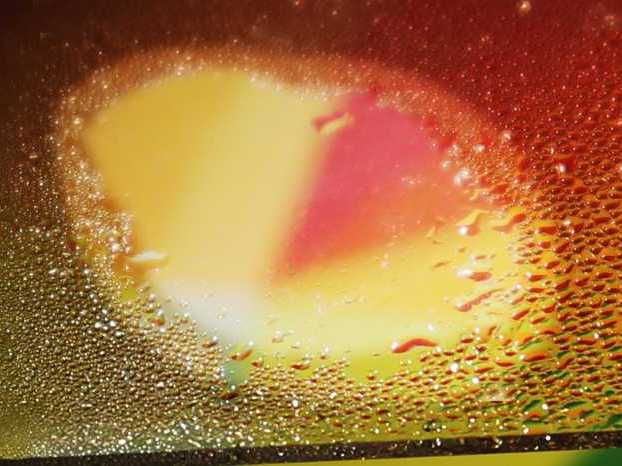
In the ETH lab, shining a light through the centre of a transparent pane coated with nanoparticles prevents the lit area from fogging.
ETH Zürich / Christopher Walker
Anyone who skis, wears glasses, uses a camera or drives a car is familiar with the problem: if you come into a humid environment from the cold, your eyewear, camera lens or windshield can quickly fog up. Researchers at ETH Zurich have now developed a new transparent material coating that greatly reduces this effect. Just a few nanometres thick, their durable coating is made of gold nanoparticles embedded in non-conductive titanium oxide.
“Our coating absorbs the infrared component of sunlight along with a small part of the visible sunlight and converts the light into heat,” explains Christopher Walker, a doctoral student in ETH Professor Dimos Poulikakos’s group and lead author of the study. This heats the surface up by 3 to 4 degrees Celsius. It is this difference in temperature that prevents fogging.
Passive heating
Heat is also the answer to the problem of fogging on car windows. Warm air from the in-vehicle heating system heats the front windscreen, while the rear window is fitted with a grid of electrical heating elements. But unlike these methods, the ETH researchers’ new coating works passively. Since the only energy source required is the sun, their coating is especially suitable for wearable items such as glasses and goggles.
Efstratios Mitridis, another doctoral student in Poulikakos’s group, explains what makes the new surface coating so special: “Normally, it’s dark surfaces that absorb light and convert it into heat,” he says, “but we’ve created a transparent surface that has the same effect.”
Better than anti-fog sprays
Condensation occurs on a surface whenever there is a sudden drop in temperature or increase in humidity, forming tiny droplets of water that disperse incident light in different directions in much the same way as atmospheric fog. As an alternative to using heat to prevent fogging, susceptible surfaces can be coated with hydrophilic agents. Because they attract water, these agents ensure that the condensation forms an even thin film of liquid over the surface rather than separate droplets. Anti-fog sprays for glasses usually work on this principle.
Now, tests have shown that when exposed to sunlight, fogged surfaces coated with gold nanoparticles and titanium oxide clear four times faster than surfaces treated with a normal anti-fog agent. “Spray treatments often lose their effect after a while because the anti-fog film dries up or becomes unevenly distributed,” Walker says. “A durable coating like ours lasts much longer than a spray treatment, which you have to apply virtually on a daily basis,” he adds.
The ETH scientists are now planning to bring their new method to market, in collaboration with a partner from industry. “We’re looking to refine our already robust coating to ensure it lasts for years, and we want to take the technology from lab scale to industry scale,” Walker says. Their coating has a huge range of potential applications, including car windshields and rear-view mirrors as well as ski goggles and diving masks.
Original publication
Other news from the department science
These products might interest you

OCA 200 by DataPhysics
Using contact angle meter to comprehensively characterise wetting behaviour, solids, and liquids
With its intuitive software and as a modular system, the OCA 200 answers to all customers’ needs
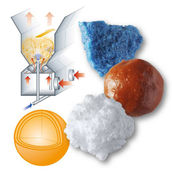
Tailor-made products for specific applications by IPC Process Center
Granulates and pellets - we develop and manufacture the perfect solution for you
Agglomeration of powders, pelletising of powders and fluids, coating with melts and polymers
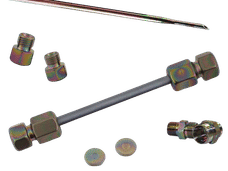
Dursan by SilcoTek
Innovative coating revolutionizes LC analysis
Stainless steel components with the performance of PEEK - inert, robust and cost-effective

Get the chemical industry in your inbox
By submitting this form you agree that LUMITOS AG will send you the newsletter(s) selected above by email. Your data will not be passed on to third parties. Your data will be stored and processed in accordance with our data protection regulations. LUMITOS may contact you by email for the purpose of advertising or market and opinion surveys. You can revoke your consent at any time without giving reasons to LUMITOS AG, Ernst-Augustin-Str. 2, 12489 Berlin, Germany or by e-mail at revoke@lumitos.com with effect for the future. In addition, each email contains a link to unsubscribe from the corresponding newsletter.
Most read news
More news from our other portals
Last viewed contents
VWR Enters into Definitive Agreement with Avantor - Avantor to Acquire VWR for $6.4 Billion
Category:Modern_human_genetic_history
Category:Alkaloids
